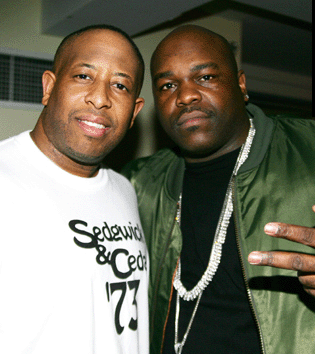Acclaimed Beatmakers Lobby for Work; Celebrity Beatwork Solicitation Means Your Favorite Beatmaker is Now Competing with You
| By Amir Said (Sa’id) |
 Beatmaking is a new musical phenomenon, as such, the price parameters and ceiling was being set—in real time—in the 1990s. And what was the price parameters and ceiling for beats based on? Well, in many ways, the model for previous music producers, prior to the advent of professional beatmakers.
Beatmaking is a new musical phenomenon, as such, the price parameters and ceiling was being set—in real time—in the 1990s. And what was the price parameters and ceiling for beats based on? Well, in many ways, the model for previous music producers, prior to the advent of professional beatmakers.
By 1999, it became clear that not all beatmakers were actually in the studio with rappers “producing,” helping out with song ideas, vocal coaching, mixing, etc. Thus, quite naturally, beat prices necessarily had to go down. Think about it: If a beat goes to a rapper, without the beatmaker’s presence, well, then what you have is a situation where the “building materials” (the beat) are being bought wholesale; which is to say that the beat, without the beatmaker’s direct input—post beat sell, the beat should be less expensive. Add to that mix the fact that the number of able beatmakers grew exponentially over the pass 10 years, and what you got (naturally) was a dramatic drop in beat prices; in other words, the beat market prices corrected themselves. It was inevitable.
Can’t Blame this One on Poor Music Sales and Illegal Downloads
There’s only so much that you can blame poor (physical) CD sales and illegal downloads for. Poor music sales and illegal downloads is NOT a major factor in why beat prices have gone down! As I mentioned earlier to DK, “beatmaking is a new musical phenomenon, as such, the price parameters and ceiling was being set—in real time—in the 1990s.” In other words, $25,000 and above beat prices were unreasonable in the first place; it just took a little time for the market to correct itself.
Thing is, beat prices began to go down rather quickly. By 1994, prices were steadily going down for MOST acclaimed beatmakers; only a specific few were able to command exorbitant beat prices and fees. Sure, the likes of Dr. Dre, Darkchild, Timbaland, and The Neptunes saw their prices go up; but they also would eventually see their workloads go down…waaay down. Why? It’s simple: price point too high—and with no “guaranteed” hit, there were very few takers willing to absorb the risk.
Thus, the true market price range for quality beats has, in reality, always been roughly $3,000-$7,000 per beat! And consider this fact, in many cases, between 1989-1999, the bigger beat price tags for most acclaimed beatmakers typically covered MULTIPLE flat-rate beat deals, usually 3-8 beats (plus in-studio work) depending on the beatmaker and the specific rapper or other artist involved.
And as far as a level playing field, I believe it already exists. However, this level playing field is “upside down;” that is to say, there’s no protection against one beatmaker underbidding another beatmaker. Indeed, for every one beatmaker who commands $10,000, there’s another one equally capable who will accept $5,000; and there are thousands more who might be just as good, who are willing to take $1,000; and there might be tens of thousands more who are almost as adequate, who are willing to forgo any payment, in exchange for production credit. Therefore, the only real choice that any career-worthy beatmaker has is to unionize.

A union of beatmakers sounds like a good idea. But what would you propose the flat rate for each beat be – $1,000?. Also would this union negotiate a health care agreement with the 4 main music companies?